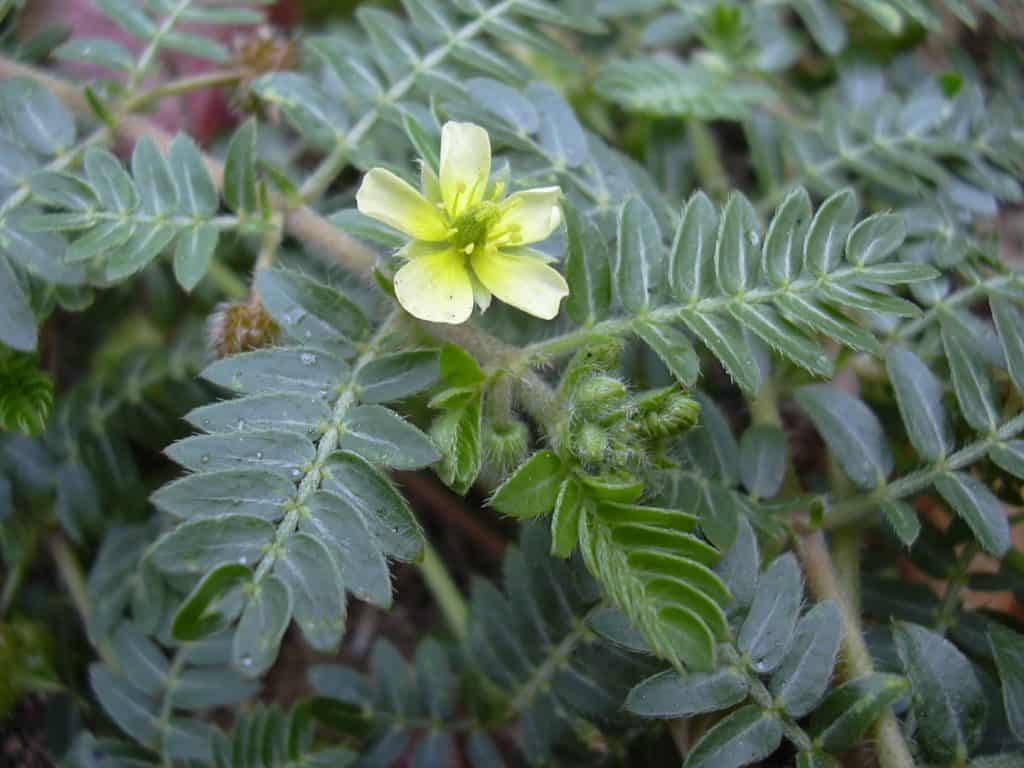A plant whose efficacy is proven and debunked by various studies is Tribulus Terrestris. Tribulus Terrestris is used in Chinese medicine as an aphrodisiac, and in other Asian cultures, the plant is known for its ability to increase sexual desire. In Chinese, it is called ‘baj ju li’ and it is believed to help increase libido. Additionally, the plant is known for its apparent positive effects on muscle growth. Over the years, many studies have been conducted on the effects of the tribulus plant concerning libido and testosterone levels.

Table of Contents
- Origin of Tribulus Terrestris
- Application of Tribulus Terrestris
- Muscle Growth
- Studies on Tribulus Terrestris
- Difference in Studies by Manufacturer and Independent Studies
- Dangers of Tribulus Terrestris
- Tribulus Terrestris Increases Risk of Gynecomastia
- Tribulus Terrestris as NO Booster and Penile Pump
- Conclusion
Origin of Tribulus Terrestris
Tribulus Terrestris is a plant (belonging to the thistle family) that grows in many places around the world, including Eastern and Southern Europe (especially Bulgaria), Asia, Africa, and Australia. The plant contains steroidal saponins, steroid-like substances. A dried extract of the plant is made by grinding parts and mixing them with a liquid that extracts all the substances.
Subsequently, the solvent is evaporated, leaving only the concentrated substance. It is used in traditional Chinese medicine to improve liver and kidney function. In Indian Ayurveda (Hindu health science), it is used as a nerve tonic, aphrodisiac, and diuretic (aids in urination)(1).
The name of the plant comes from Latin, where the word “Tribulus” literally translates to “problem.”
Application of Tribulus Terrestris
In many different cultures, the plant was used for multiple applications. For example, in Chinese medicine, the plant was used to stimulate the function of:
- Kidneys
- Liver
- Digestion
- High blood pressure
- Libido
In the world of sports, it is believed that increasing libido, through the positive effect on testosterone levels, supplementation with tribulus could lead to a positive impact on muscle growth.
Muscle Growth
Tribulus could potentially have a positive effect on testosterone levels, stimulating libido. Due to the assumed increase in testosterone, the plant may have a potential anabolic effect. The theoretical idea behind this is that the plant increases the LH hormone produced by the pituitary gland. The amount of LH hormone has a positive effect on testosterone levels.
Studies on Tribulus Terrestris
In a study in the 1970s, it was demonstrated that the tribulus plant had a positive effect on enhancing libido. This potency-enhancing effect is partly due to its effect on nitric oxide levels. This level increases with tribulus intake, dilating blood vessels and reducing blood pressure. This promotes circulation. Therefore, you can find this herb in many potency pills because tribulus enhances the formation of an erection. As the blood vessels dilate, blood flow to the penis begins. Therefore, improved erection is achieved through better blood circulation, not by increasing testosterone, as long believed.
But if you take a closer look at the research, you will quickly find that the vast majority of positive effects on testosterone levels can be attributed to research funded by the manufacturer of tribulus supplements. In independent studies, it has been shown that the effect on testosterone is very minimal, if any.
Difference in Studies by Manufacturer and Independent Studies
Studies funded by the manufacturer of tribulus often report a positive effect on testosterone levels. However, independent research has not confirmed these findings. Most independent studies have shown little to no effect on testosterone levels.
Dangers of Tribulus Terrestris
Several dangers are associated with the use of tribulus terrestris, such as:
- Increased risk of gynecomastia (breast growth in men)
- Impairment of liver function
- Increased risk of kidney damage
- Increased blood pressure
- Increased heart rate
Tribulus Terrestris Increases Risk of Gynecomastia
When using tribulus terrestris, there is a risk of developing gynecomastia, or breast growth in men. This effect is due to the presence of phytoestrogens in the plant. Phytoestrogens are substances that have an estrogen-like effect on the body. They can disrupt the hormonal balance and lead to unwanted side effects such as gynecomastia.
Tribulus Terrestris as NO Booster and Penile Pump
The plant is used by some as a NO booster (nitric oxide) and as a penile pump. Nitric oxide is a molecule that plays a crucial role in vasodilation, the process of widening blood vessels. Widening blood vessels can improve blood flow, which may help with erectile dysfunction. However, there is limited scientific evidence to support the effectiveness of tribulus terrestris as a NO booster or penile pump.
Conclusion
Although Tribulus Terrestris has been used for centuries in traditional medicine and is marketed as a natural way to boost testosterone levels and enhance libido, scientific evidence supporting its effectiveness is limited and often conflicting. While some studies funded by manufacturers report positive effects on testosterone levels, independent research suggests minimal to no impact. Moreover, the use of tribulus terrestris may pose certain risks, including gynecomastia and liver or kidney damage. Therefore, individuals considering supplementation should weigh the potential benefits against the possible risks and consult with a healthcare professional.

